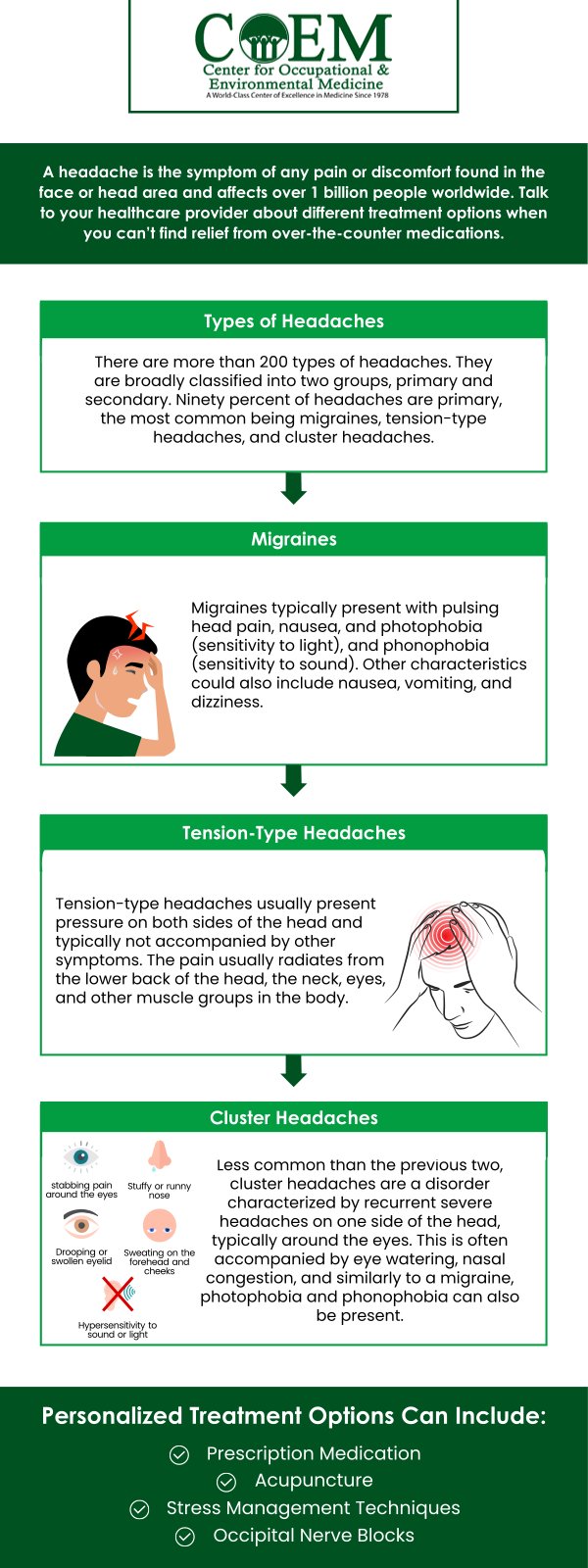Headaches and Migraines Diagnosis & Treatment in Charleston, SC
At The Center for Occupational and Environmental Medicine (COEM), we specialize in a comprehensive approach to identifying an individual’s headache triggers. For more information, contact us today or book an appointment online. We are conveniently located at 7510 North Forest Drive North Charleston, SC 29420. Patients routinely fly in to be evaluated by COEM, as we serve patients internationally. Find out if you have been exposed, extensive lab testing is available.




By Allan D. Lieberman, M.D. (Founder/Retired)
We’ve all experienced a headache from time to time. Some people, however, suffer from chronic headaches. What can be done when neurological evaluation fails to find any reason for them?
Like so many other symptoms, headaches usually have very specific causes for each individual. At The Center for Occupational and Environmental Medicine (COEM), we specialize in a comprehensive approach to identifying an individual’s headache triggers.
In our experience, some of the worst headaches (including migraine) are often food related — although other environmental triggers may come into play as well. As a rule of thumb, if a headache is food-related, the offending foods are usually those that the individual craves and eats the most. Many of the common food triggers we call the “c” foods because they begin with the letter “c”: cane (sugar), corn, cola, chocolate, coffee (and caffeine), cheese, chicken, and citrus (most often orange). For some patients, it is not just the food itself that is the problem but additives, preservatives, colorants, or fermentation by-products (yeasts and molds) incorporated in food processing. A major problem is that some of these common food triggers are very difficult to completely avoid, especially corn and cane sugar because they are often ingredients–and sometimes hidden ingredients–in many food items. Fortunately, individualized testing to identify food sensitivities, followed by appropriate desensitization extracts, has helped many patients overcome reactions from even hidden foods.
Headache sufferers don’t often think of food as a culprit for producing severe head pain because many food sensitivities and intolerances cause delayed reactions. It may take up to 48 to 72 hours after eating the offending food before symptoms are full blown. In addition, headache sufferers may not have experienced chronic headaches until later in life when viral, fungal, or bacterial infections compromised their digestive tract. This increased “gut permeability” caused by infection allows larger food particles to cross the gut wall and set off immune or allergic reactions, leading to headache in some individuals. In these cases, we must identify and treat latent infections and provide specific nutrients to help heal gut permeability, before a person can experience full relief from headaches.
Blood sugar swings, especially when blood sugar levels fall too low, can cause recurring headaches. We find that many people don’t know how to overcome this problem, but rather self-treat by using concentrated sugars and sweets to rapidly bring the blood sugar back up– inadvertently perpetuating the cycle. Or they may rely on unbalanced diets to try to prevent blood sugar swings, which can create other physiological imbalances in the body. We have to work carefully over time with these individuals to restore proper carbohydrate tolerance and balance the endocrine system. Not only headaches but also many other chronic problems disappear with this approach.
For other headache sufferers who are women, head pain may be related to cyclical hormonal imbalances. At The Center for Occupational and Environmental Medicine (COEM), we are able to thoroughly evaluate and naturally restore a woman’s delicate hormonal balance using bio-identical hormones. In addition, desensitization to a woman’s hormones may be needed in some cases.
By addressing all these many factors, we are pleased that for many patients the terrible pain of chronic headache is relieved—for good! For more information, contact us today or book an appointment online. We are conveniently located at 7510 North Forest Drive North Charleston, SC 29420. We serve patients from Charleston SC, Mount Pleasant SC, Summerville SC, North Charleston SC, Goose Creek SC, Ladson SC, Hanahan SC, James Island SC, John’s Island SC, Daniel Island SC, West Ashley SC, Moncks Corner SC, Sullivans Island SC, Folly Beach SC, Isle of Palms SC and all of South Carolina, Nationally, and Internationally. Patients routinely fly into Charleston to be evaluated by COEM and to enjoy this beautiful city, which is a Condé Nast and Travel and Leisure Top Domestic and International Tourist Destination.

Additional Services You May Like
- Functional Medicine
- Allergy and Autoimmunity
- Asthma and COPD
- Autoimmune Diseases
- Allergy and Immunology
- Anti Aging Medicine
- Autism and Children
- ADHD
- Bacterial Infections
- Chemical Toxicity
- Candida Fungal Problems
- Cancer Treatment
- Chronic Illness
- Chronic Inflammatory Response Syndrome (CIRS)
- Chronic Fatigue
- Cardiovascular Disease
- Carbon Monoxide Poisoning
- Chelation Therapy
- Depression
- Environmental Medicine
- Ear Ringing and Dizziness
- Fatigue Treatment
- Fertility and Preconception Care
- Gut Health
- Heavy Metal Toxicity
- Hormonal Imbalances
- Headaches and Migraines
- Hormone Balancing (Men & Women)
- Hepatitis
- Integrative Medicine
- Independent Medical Evaluations
- Influenza
- Lab Testing
- Mold Toxicity
- Malnutrition
- Neurodegenerative Disease
- Natural Hormone Balancing For Women
- Preservative-Free IV Therapy
- Stomach Acid Imbalance
- Smoking Cessation Program
- Skin Therapy (Anti-Aging)
- Swine Flu
- Thyroid
- Mold Toxicity
- Vitamin D
- Weight Loss Program
- Women’s Breast Health Formula

Additional Services You May Like
- Functional Medicine
- Allergy and Autoimmunity
- Asthma and COPD
- Autoimmune Diseases
- Allergy and Immunology
- Anti Aging Medicine
- Autism and Children
- ADHD
- Bacterial Infections
- Chemical Toxicity
- Candida Fungal Problems
- Cancer Treatment
- Chronic Illness
- Chronic Fatigue
- Cardiovascular Disease
- Chronic Inflammatory Response Syndrome (CIRS)
- Carbon Monoxide Poisoning
- Chelation Therapy
- Depression
- Environmental Medicine
- Ear Ringing and Dizziness
- Fatigue Treatment
- Fertility and Preconception Care
- Gut Health
- Heavy Metal Toxicity
- Hormonal Imbalances
- Headaches and Migraines
- Hormone Balancing (Men & Women)
- Hepatitis
- Integrative Medicine
- Independent Medical Evaluations
- Influenza
- Lab Testing
- Mold Toxicity
- Malnutrition
- Neurodegenerative Disease
- Natural Hormone Balancing For Women
- Preservative-Free IV Therapy
- Stomach Acid Imbalance
- Smoking Cessation Program
- Skin Therapy (Anti-Aging)
- Swine Flu
- Thyroid
- Mold Toxicity
- Vitamin D
- Weight Loss Program
- Women’s Breast Health Formula










